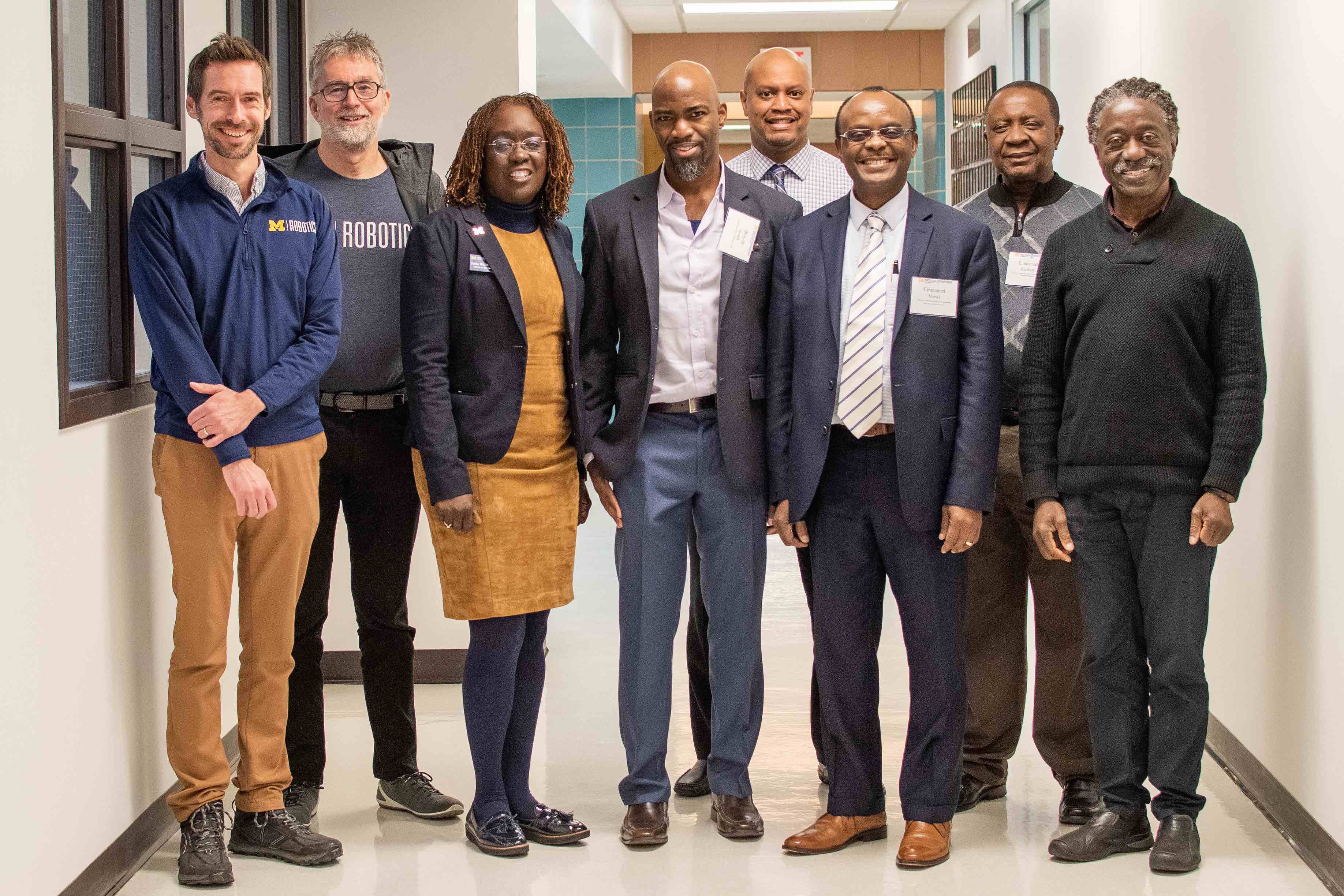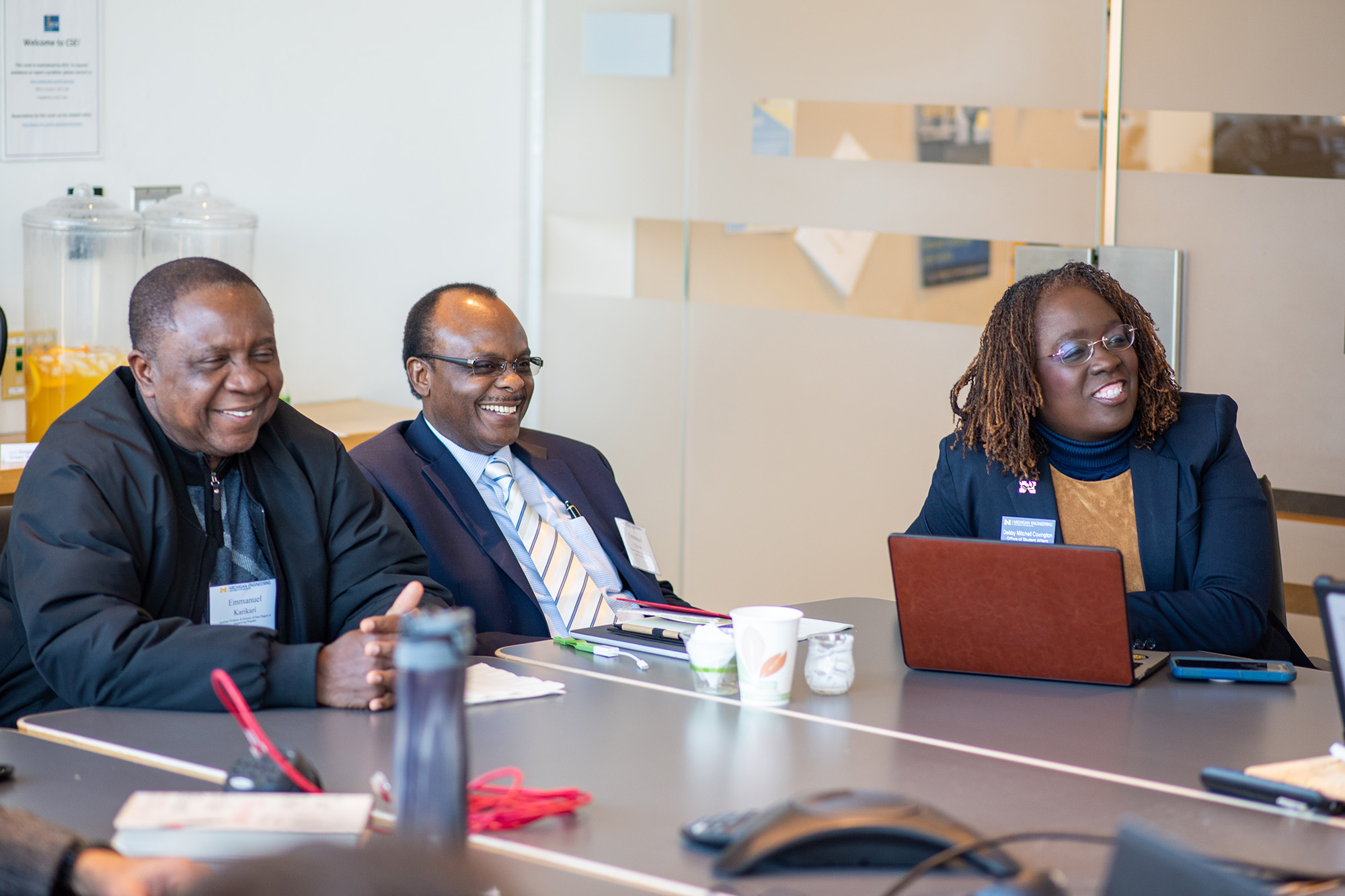Institution partnerships offer best of both worlds
ECE helped host faculty from Morehouse College and Prairie View A&M University to explore cross-collaboration opportunities, which allow students and faculty to experience the cultures of both Historically Black Colleges & Universities and U-M.

 Enlarge
Enlarge
In collaboration with the Office of Student Affairs, Civil and Environmental Engineering, Aerospace Engineering, and Michigan Robotics, ECE organized a visit day this fall for faculty from Morehouse College and Prairie View A&M University.
“The goal of the visit was to create a forum for faculty to explore synergistic opportunities for research, teaching, and student development,” said Debby Covington, the Director of Partnerships, Outreach, and Recruitment in the Office of Student Affairs. “We wanted the faculty to become more familiar with each other’s schools, institutional culture, science and engineering programs, and best practices, so they can better collaborate and help students with their academic and professional endeavors.”
U-M and Morehouse already have a long-standing partnership through the Dual Degree in Engineering Program, which began in 2004. As part of this program, students from the Atlanta University Center Consortium (Clark Atlanta University, Morehouse College, and Spelman College) are able to earn two bachelor’s degrees: one in LSA from their home university and one in Engineering from U-M. This visit, supported by funds from the Rackham Recruitment Grant, explored ways to strengthen the current relationship with Morehouse and develop new avenues of partnership with Prairie View A&M.
The visit began with a presentation from Alec Gallimore, the Robert J. Vlasic Dean of Engineering, Richard F. and Eleanor A. Towner Professor, and Arthur F. Thurnau Professor. The dean spoke about the mission and goals of U-M and Michigan Engineering, as well as a variety of student support services and resources.
“He was speaking about transparency, and what was beautiful was I felt that theme throughout the visit,” said Morehouse Prof. Dwayne Joseph, who’s been involved with the dual degree program for seven years. “Michigan has always been one of our strongest partners. They really make sure our students are taken care of. The support is just there.”

 Enlarge
Enlarge
Students currently enrolled in the dual degree program also attended the morning session with the dean.
“It really showed me how dedicated Michigan is to their students,” said Caleb Davis, a dual degree student who studied Mathematics and Applied Physics at Morehouse and is studying Electrical Engineering here. “Michigan wants you to succeed, and I really appreciate that, because this is not an easy school. But if you can get past the difficulties, you can transform yourself. This is a place of growth, and I’m here for that. I’m ready for it.”
Conversations included ways to facilitate more cross-collaboration among all of the institutions to maximize the benefit to everyone.
“Michigan Engineering’s leadership provided the resources and invested the time to cultivate a relationship among the institutions,” said Prof. Emmanuel Nzewi, Head of the Department of Civil and Environmental Engineering at Prairie View A&M. “They showed us that they are committed to achieving a lasting mutually beneficial relationship, and we are fully invested in helping develop it.”
In addition to presentations, the visiting faculty also received tours of other departments. The presentations included info on U-M’s curriculum and how to best prepare students for Michigan Engineering’s academic environment.
“It definitely inspired us,” Joseph said. “I came back with a lot of ideas for my department and for when we visit other engineering schools. Michigan really sets the bar.”
Michigan really sets the bar.
Prof. Dwayne Joseph, Morehouse College
Prof. Heath Hofmann, a chief organizer of the event, said another one of the goals is to strengthen the pathways to graduate school.
“We do pretty well at admitting qualified students from all backgrounds and getting them to come here,” Hofmann said. “But we want to do everything we can to make sure we’re not missing out on qualified applicants. We want to encourage as many people as possible to apply.”
In addition to student recruitment, a stronger partnership with Michigan Engineering’s grad programs could open avenues for faculty to cross-collaborate across institutions. This would be particularly applicable to Prairie View A&M, which offers its own graduate degree programs in engineering.
“Prairie View Engineering can develop its academic programs using Michigan as a model,” said Nzewi. “I believe that the potential for meaningful collaboration is endless.”
I believe that the potential for meaningful collaboration is endless.
Prof. Emmanuel Nzewi, Prairie View A&M University
Partnerships like this also help improve representation in the student body and in the field. Underrepresented minorities in STEM include women, Hispanics, and African Americans. Research has shown that when people have role models – professors, bosses, etc.– who look like them, they are more likely to see that career path as an option for themselves.
“It opens up possibilities for a wide number of people,” Hofmann said. “It’s also important to get people from different backgrounds in engineering. Different perspectives are important when trying to solve problems that have a societal impact.”
While there are many benefits, one of the biggest challenges for students – whether they’re part of the dual-degree program or are involved in a similar partnership – can be the change itself.
“You’ve been used to a school for ‘x’ amount of years, and coming here you’re exposed to a different environment entirely – rigor, student body, everything,” said Robert Mason, a dual degree student who studied Applied Physics at Morehouse and is studying Electrical Engineering here.
While the transition can be a bit of a culture shock, Mason and Davis said that the different environments complement each other and help round-out their education. Davis said that at Morehouse, he gained important social and networking skills, and he learned how to improvise solutions from scratch, whereas Michigan provides a wealth of resources to put his ideas into practice.
“The thing I really like about Michigan is that it’s really diverse,” Davis said. “It brings together different groups of people, and it’s so interesting interacting with the large myriad of people here.”
The thing I really like about Michigan is that it's really diverse. It brings together different groups of people, and it's so interesting interacting with the large myriad of people here.
Caleb Davis, EE undergrad
Mason said that it took a bit more effort to form a network here, but it also allowed him to expand his network in different ways.
“My network now includes people from different states and different countries, and that’s definitely a huge positive from being in this program,” Mason said.
Joseph said that it helps that Morehouse has a strong contingent of students in the dual degree program, so students are able to maintain relationships with their friends and peers from their home institution. He also stressed the abundance of student groups on U-M’s campus, and how many of them provide a strong community for those who may feel overwhelmed by Michigan’s size.
“The minority student organizations really give students the opportunity to take full advantage of doing more for social justice and social reform,” Joseph said. “They can find better ways to improve situations for themselves and their colleagues in the community.”
Herbert Winful, the Joseph E. and Anne P. Rowe Professor of Electrical Engineering and Arthur F. Thurnau Professor, also attended lunch with the visiting faculty and spoke to them about the community.
“Faculty want to know that they are sending their students to a place where they will thrive, where they will be supported, where there’s community,” Winful said. “Every time I go to a PhD defense by one of our Black students, I’m amazed at how many people show up. It’s like the entire African American community on campus that’s engaged in STEM shows up, and it’s just a wonderful thing to behold.”
 MENU
MENU 
